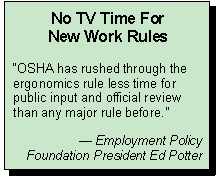None of the broadcast networks took time from their ongoing
coverage of the Florida re-count to tell viewers that the lame duck
Clinton administration had pushed through new workplace rules that
could cost employers up to $126 billion a year. Yet despite all of
the political news, the November 27 edition of U.S. News & World
Report successfully included a report by Kim Clark explaining
why the business community has objected so strenuously to the new
rules.
 OSHA’s
new rules aim to protect workers from repetitive stress injuries by
mandating that companies spend money to improve workstations or to
take other steps that might be necessary. The Employment Policy
Foundation, a non-partisan economic research foundation that focuses
on workplace trends, has estimated the cost of the new rules to U.S.
businesses at between $91.4 and $125.8 billion per year.
OSHA’s
new rules aim to protect workers from repetitive stress injuries by
mandating that companies spend money to improve workstations or to
take other steps that might be necessary. The Employment Policy
Foundation, a non-partisan economic research foundation that focuses
on workplace trends, has estimated the cost of the new rules to U.S.
businesses at between $91.4 and $125.8 billion per year.
On his group's website,
EPF’s President Ed Potter also pointed out that in spite of its
heavy cost and potential for disrupting workplaces,"OSHA has rushed
through the ergonomics rule less time for public input and official
review than any major rule before."
It’s a big story that warrants national coverage, and Clark
pointed out some of the key disputes business has with OSHA
regarding the new rules. After spotlighting the voluntary efforts of
the Cannondale Corp.’s bicycle plant to aid workers, Clarks wrote
that "even ergo-friendly businesses like Cannondale are fighting the
new rules. They don’t want to be responsible for a strain caused by,
say, golf but aggravated at the office. And they oppose a clause
that would make them pay injured workers 90 percent of net pay
directly, rather than have them apply for workers’ compensation."
"And then there’s the cost," Clark continued. "Business groups
fear the regulations could cost companies $120 billion more than the
$4.5 billion annual tab OSHA estimated."
Obviously, the disputed presidential election results are bigger
news, but the election is big news precisely because the new
President will have the authority to make key decisions on the OSHA
rules and a host of other simmering disputes. "If Vice President
Gore emerges as president, the new regulations are likely to take
effect, unless a Federal court overturns them," the New York
Times reported on November 18. "If Gov. George W. Bush of Texas
becomes President, he is not likely to block further congressional
efforts to rescind the regulations or withhold money to enforce
them."
Ultimately, governance matters more than than politics, even
though it’s sometimes hard to resist the lure of a big political
story. Kudos to U.S. News & World Report for alerting readers
to a key policy dispute that will await the next President.
— Rich
Noyes












 OSHA’s
new rules aim to protect workers from repetitive stress injuries by
mandating that companies spend money to improve workstations or to
take other steps that might be necessary. The Employment Policy
Foundation, a non-partisan economic research foundation that focuses
on workplace trends, has estimated the cost of the new rules to U.S.
businesses at between $91.4 and $125.8 billion per year.
OSHA’s
new rules aim to protect workers from repetitive stress injuries by
mandating that companies spend money to improve workstations or to
take other steps that might be necessary. The Employment Policy
Foundation, a non-partisan economic research foundation that focuses
on workplace trends, has estimated the cost of the new rules to U.S.
businesses at between $91.4 and $125.8 billion per year.